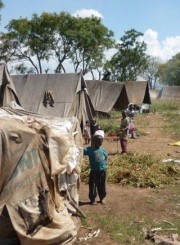As Kenya continues to address its 2007-08 postelection violence, greater emphasis should be placed on victims’ reparative justice demands, according to a new ICTJ report. The report, “To Live as Other Kenyans Do”: A Study of the Reparative Demands of Kenyan Victims of Human Rights Violations, is a survey of nearly 400 victims’ views and needs as a result of the violence.
The report first explains how victims experienced violations of civil, political, social, and economic rights. Some interviewees survived massacres, extrajudicial killings, and torture committed by both state and colonial security forces. Others suffered displacement as a result of interethnic and state-sanctioned election-related violence, often accompanied by sexual and gender-based violence.
It then summarizes what victims suggested to repair the consequences and address the causes of the human rights violations they suffered. Interviewees focused on demands for acknowledgement by the state of their suffering, and a restoration of the lives they led previously. Participants also expressed their need for physical, social, and economic security.
The study was conducted in six regions in the country and met victims of a range of past human rights violations occurring during varied periods from the colonial era in the 1950s to the election-related violence in 2007-08.
Key recommendations include implementing an urgent reparations program to address the needs of the most vulnerable victims, as well as establishing a process to lead to a more comprehensive reparations program in the future. This would address a wide range of human rights violations through a combination of symbolic and material reparations measures.
